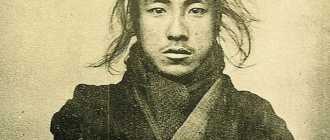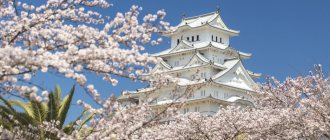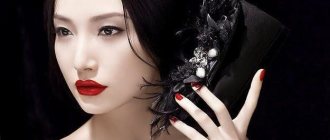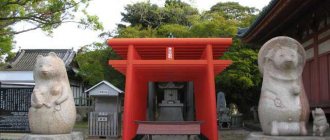Japanese idols
We went through Japanese models, and we can take a look into the world of the Japanese entertainment industry. In addition to men who combine modeling with other activities, there are men who combine several creative aspects)). This is what I want to focus on. So, who is the most popular person in modern Japanese culture right now? Here are some of them.
Let's start with J-pop (Japanese pop music). "Arashi" ("storm, storm") is a five-member idol group that millions of fans are crazy about. One way or another, each of these guys is also involved in acting in addition to music. Plus they host a popular show on Japanese TV.
Matsumoto Jun is the main handsome guy of the group. Jun became doubly popular after the drama “Boys Over Flowers” (played by Tsukasa Domyoji). This is where the fans completely lost their minds.
Masaki Aiba is another comrade who, in addition to the talents mentioned above, also works in radio.
Kazunari Ninomiya - This Arashi member has gone even further: he is a voice actor. Ninomiya managed to star in many films, especially noteworthy is the role of Saigo in Eastwood's film Letters from Iwo Jima, which received a number of awards and nominations, including an Oscar.
Sho Sakurai also keeps up with his colleagues))
Well, the leader of the group (I never would have thought!) is Ono Satoshi. This guy looks like a cute kid (and he's 30 years old, by the way). There are very good reviews about him regarding acting in the theater. Also Satoshi...a sculptor. In 2007, his personal exhibition was held in Japan.
Another idol is Takuya Kimura, a member of the group “SMAP” and an actor, and he is very active in both
"Mr. Brain"
There is such a profession in Japan - seiyuu, i.e. anime voice actor. So voice actors are incredibly popular. Of course, with such and such voices.
Many of them are also not limited to one profession, such as Mamoru Miyano, who also sings. I don’t know if he is considered handsome in his homeland, but for me, far from it. But Mamoru is a real pro in his field! One of the best. My favorite voice actor. To compare the voice transformation, you can watch a couple of animes. Well, his voice acting of Light Yagami from Death Note (anime, I think, will appeal to everyone without exception: even if you hate this style of drawing, the plot is impressive) is simply brilliant. And he sings very well.
I’ll mention another singing comrade from this workshop - Daisuke Ono. He became popular after Black Butler (Sebastian Michaelis). In my opinion, despite the high skill of dubbing (the voice is what it takes!) and all my respect, I still need to improve a lot in vocals))
Well, there are so many rockers in Japan! Hyde is the lead singer of the groups L'Arc-en-Ciel and Vamps, and has also done many solo projects. Hyde also managed to act in a movie - “Moon Child” with his friend Gackt, but more on that later.
Miyavi is very popular not only in Japan, but also in the world, among J-rock fans. As a child, he dreamed of becoming a football player, but after a leg injury he switched all his attention to the guitar. In his songs the guitar is given a lot of attention. Eyewitnesses who attended his concerts in Russia say that his live performances are simply incredible. It would be interesting to see.
By the way, don't be scared by the appearance). The Visual Kei style is an integral attribute of Japanese rockers. Many who are ignorant of this issue, seeing such colorful makeup on rockers from the Land of the Rising Sun, think that they are all gay. Nope. This is part of their culture and one of the ways to not lose the attention and love of their fans.
At his wedding, Miyavi didn't look quite like a rocker :).
Well, where would we be, speaking of J-rock, without the Japanese god? I just can't help but mention it. The main idol of Japanese musical culture is Gackt. I was fascinated by his voice, but reading his biography for the first time, I was not without skepticism: singer, actor, dancer, multi-instrumentalist, designer, etc. and so on. Yeah, I think we have such actresses-singers, actors-singers, a wagon and a small cart! Everything's clear with you. No such luck! Perfectionist is a diagnosis. And having become more closely acquainted with all areas of Gackt’s activity, I was convinced that whatever he undertakes, he does everything simply amazingly.
An example of acting. Here is a noble samurai:
Here is a psycho cannibal, all from the same “Mr. Brain”.
How K-pop became the dream of Japanese teenagers
Japanese Yuka Hasumi dropped out of high school and flew to South Korea to try her luck at becoming a K-pop idol. She was not afraid that this would require her to spend long hours studying vocals and dancing, that she would not have a personal life, a boyfriend and a smartphone. Seventeen-year-old Hasumi enrolled in Acopia, a prep school in Seoul that encourages Japanese teenagers to try their hand at K-pop. The school's students learn dance, song and the Korean language.
She is one of the many aspiring K-pop idols. There are millions like her - desperately hoping to make it in the battle of talent agency auditions.
“Tsukaretta (It’s hard),” says Hasumi, tired after her dance lesson.
“I think I will be able to debut after I complete all the rigorous training and improve my skills to perfection,” she says.
Every year, about 500 young Japanese join Acopia, paying up to $3,000 a month in tuition. The school also holds auditions for its candidates at talent agencies, opening doors to the world of big K-pop.
An influx of Japanese talent is reshaping the K-pop industry at a time of increasingly bitter political strife between the two countries. Tensions caused by Japan's colonization of Korea from 1910-45 rose again following South Korean court rulings against Japanese companies and the South Korean government's view that Japan had failed to atone for its colonial past.
However, the popularity of modern Korean culture and music in Japan continues to grow, and Japanese idol applicants say they are not worried about diplomatic tensions.
Many South Korean schools and agencies are running campaigns to attract Japanese talent.
“It will be good if Japan and South Korea get along through music,” Hasumi says.
Some Japanese artists have already done this in practice. Twice's three Japanese members helped make the group the second most popular group in Japan after Korea's BTS. This success prompted their agency, JYP Entertainment, to work on creating a group that would include only Japanese girls.
TWICE concerts in Japan: the first footage shows Japanese girls Mina and Sana
However, agency officials are reluctant to discuss either their successes in Japan or the promotion of Japanese talent in Korea for fear of inflaming political tensions. In Korea, campaigns of harassment against idols and agencies periodically flare up for their statements about Japan's past, the use of songs by Japanese authors suspected of far-right views, even the inadvertent use of a sticker with a Japanese flag. Sometimes this covers entire fandoms, and threatens agencies with a boycott of their products.
Video of mixed Korean-Japanese group IZ*ONE
There's definitely no shortage of Japanese hopefuls at agencies, with some even leaving successful careers in their homeland to seek fame in Korea.
“Everyone is trying to scare me that I won’t have free time or I won’t be able to do what I want. But I think all K-pop stars have gone through this,” says Nao Niitsu, a 19-year-old student from Tokyo.
During a visit to Seoul paid for by her mother, die-hard BTS fan Niitsu auditioned with 10 agencies and passed five of them.
Miyu Takeuchi says it was an easy decision to leave a 10-year career with top Japanese group AKB48 to sign with Korean agency Mystic Entertainment as a trainee a couple of months ago. Despite her experience, she is required to attend seven hours of vocal lessons every day and two hours of dance lessons twice a week, as well as Korean lessons in the mornings. She is not allowed to have a boyfriend, but she says she has no regrets, although there is no guarantee that she will succeed in the K-pop world.
“My training needs to get to the point where my trainers and management
Gone are the days when only Korean trainees learned Japanese to promote their group in Japan. Now more and more Japanese women are learning Korean for a career in K-pop.
BTS - Japanese version of the song and video
Just 5 years ago, the Japanese market was the second most important market for K-pop after the native one. For many groups this remains true today. For example, TWICE earns almost as much from album sales in Japan as it does in Korea. The Japanese market is still important for K-pop and even scene monsters like BTS are trying to release Japanese-language versions of their songs, for which they shoot special videos. Japan's importance to the Korean entertainment industry especially increased during the period of the Hallyu boycott in China.
Now the role of Japan for top Korean groups is steadily declining. K-pop is actively entering the markets of America and Europe, while Japanese groups are stewing in their own juice in terms of style. Even leading Japanese idol projects like AKB48 or Nogizaka46 look old-fashioned not only next to the “third generation” Korean group Blackpink, but even next to many so-called groups. "Second generation". Japanese female idol projects are still quite satisfying in the domestic market and have their own fan base in East Asia, but they look relatively pale in the global market. The only exception here is the Babymetal group, which packs entire stadiums in the West, a phenomenon whose phenomenon was not immediately understood in Japan itself.
Sangita IRINCHEEVA @Yehe.Asia











